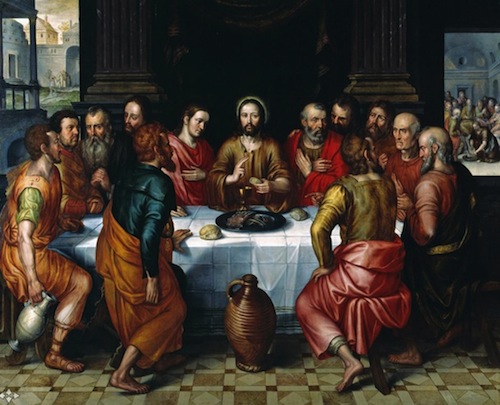If we read the four accounts of the Last Supper in the New Testament, we find that Matthew, Mark, and Luke all have Jesus and the apostles celebrating the Last Supper as a Passover meal on Thursday evening before Good Friday. But when we come to John’s Gospel, we find these two verses: 1) Then they led Jesus from the house of Caiaphas to the praetorium. It was early. They themselves did not enter the praetorium, so that they might not be defiled, but eat the Passover. (Jn. 18:28) and 2) Now it was the day of the Preparation for the Passover; it was about the sixth hour. He [Pilate] said to the Jews, “Here is your king!” (Jn. 19:14) So the question is, How could Jesus celebrate the Passover meal on a Thursday and then be crucified hours before the Passover meal on a Friday? Are the Synoptic Gospels wrong? Is John wrong? Or is there some other explanation for what appears to be a major discrepancy?
A possible logical answer is found in the 2010 Ignatius Catholic Study Bible New Testament, with commentary and notes provided by Scott Hahn and Curtis Mitch, two Biblical scholars. They offer two proposals for consideration.
The first proposal involves different Jewish calendars. The Temple authorities followed a lunar calendar, under which liturgical feasts fell on different days each year. But the Essene and Qumran communities used a solar calendar, by which Passover was always celebrated on a Tuesday night. Hahn and Mitch suggest that it was possible that Jesus used the solar calendar. Further evidence to support this hypothesis is that archeologists believe the site of the Last Supper was in a home within the Essene neighborhood of Jerusalem. In addition, if Jesus used the solar community, there would have been more time for the legal proceedings that took place between his arrest and his condemnation by the Sanhedrin. Keep in mind that Jesus was brought before five different authorities, and although these hearings could have occurred in one night, it is more than likely that they covered a period of days. Finally, a third-century Syriac text clearly states that Jesus held the Last Supper on a Tuesday night. Also, several early Church writers, including Bishop Victorinus of Pettau and Saint Epiphanius, wrote that Jesus was arrested on a Tuesday night. Interestingly, Pope Benedict accepted John’s account. In a 2007 Holy Thursday homily, he said, “Jesus truly shed his blood on the eve of Easter at the time of the immolation of the lambs. In all likelihood, however, he; celebrated the Passover with his disciples in accordance with the Qumran calendar, hence, at least one day earlier; he celebrated it without a lamb, like the Qumran community which did not recognize Herod’s temple and was waiting for the new temple.”
On the other hand, Hahn and Mitch offer the Paschal proposal. Jesus did, in fact, celebrate the Last Supper on a Thursday night. The discrepancy is the result of a misunderstanding of John’s Passover wording. For example, the Hebrew and Greek words for “Passover,” can mean more than just a meal. They can also refer to the entire Passover week and special peace offering sacrifices. Therefore, it is possible that the Jewish authorities mentioned by John (18:28) could have eaten the Seder meal but feared that, should they be defiled, they would not have been permitted to participate in the coming sacrifices. Also, the supper that Jesus attended (John 13:2) was truly a Passover meal, given the details provided by John himself: morsels were dipped, the apostles reclined at table, the meal was held at night, and some of the apostles thought Judas had left to give money to the poor–all Passover meal practices. Thus, when John refers to Jesus contemplating his hour “before the feast of the Passover,” it does not necessarily mean that this event took place the day before the Passover. It just as easily could have occurred in the afternoon before the meal. In addition, the Revised Standard Version of the Bible interprets John 19:14 to indicate that Jesus was condemned by the Sanhedrin on “the day of Preparation of the Passover.” Such a translation is possible, but Hahn and Mitch believe a better translation of the Greek term “day of Preparation” is “Friday,” the day when the Jews prepared for the Sabbath. So John 19:14 could easily mean “Friday of Passover Week.” Finally, Saints John Chrysostom and Thomas Aquinas both favored this explanation for the supposed discrepancy.
Readers of this article are strongly encouraged to study all four passion accounts to help them choose the proposal that makes more sense to them. I guarantee, that, by doing so, you will see Good Friday and Easter in a different light.




